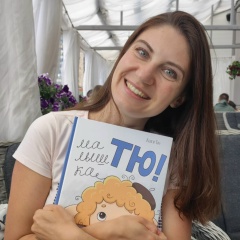#МарафонСпецификацияЦели@alexeypiter
#задание4@alexeypiter с Алексеем Верютиным (https://vk.com/alexeypiter).
"язык больше чем кровь" (с)
Пару лет назад я читал книгу Виктора Клемперер "LTI. Язык третьего рейха. Записная книжка филолога". Автор - еврей, который жил до и во время войны в Берлине. Он рассказывает про то, как нацистская пропаганда внедряла новые слова в обиход немцев. Ярлыки, унизительные названия, воинственный прилагательные и аббревиатуры появлялись в языке. В начале они казались безобидными. Но слова были как мышьяк, попадали в мозг, накапливались и постепенно отравляли мысли немцев.
Но существует и обратный процесс. Слова могут не только отравлять мысли, но и лечить. Они могут менять наше поведение в лучшую сторону.
Общаешься с одним человеком, а он речь как масло на хлеб намазывает. Слова тягучие, не конкретные. После разговора и не понятно о чем говорили и тем более о чем договорились. Вроде, пообещал, но формулировки такие, что вроде и нет.
А с другим общаешься - речь четкая, монолитная. Слова как кирпичи. Раз, два, три и еще один ряд закончен. И после такого общения нет сомнений в том, что человек сделает обещанное.
Слово рождает мысль, мысль рождает действие, а действие результат.
#СпецификацияЦелиВерютин
#задание4@alexeypiter с Алексеем Верютиным (https://vk.com/alexeypiter).
"язык больше чем кровь" (с)
Пару лет назад я читал книгу Виктора Клемперер "LTI. Язык третьего рейха. Записная книжка филолога". Автор - еврей, который жил до и во время войны в Берлине. Он рассказывает про то, как нацистская пропаганда внедряла новые слова в обиход немцев. Ярлыки, унизительные названия, воинственный прилагательные и аббревиатуры появлялись в языке. В начале они казались безобидными. Но слова были как мышьяк, попадали в мозг, накапливались и постепенно отравляли мысли немцев.
Но существует и обратный процесс. Слова могут не только отравлять мысли, но и лечить. Они могут менять наше поведение в лучшую сторону.
Общаешься с одним человеком, а он речь как масло на хлеб намазывает. Слова тягучие, не конкретные. После разговора и не понятно о чем говорили и тем более о чем договорились. Вроде, пообещал, но формулировки такие, что вроде и нет.
А с другим общаешься - речь четкая, монолитная. Слова как кирпичи. Раз, два, три и еще один ряд закончен. И после такого общения нет сомнений в том, что человек сделает обещанное.
Слово рождает мысль, мысль рождает действие, а действие результат.
#СпецификацияЦелиВерютин
#MarathonSpecificationObjectives @ alexeypiter
# job4 @ alexeypiter with Alexey Verutin (https://vk.com/alexeypiter).
"tongue is more than blood" (s)
A couple of years ago I read a book by Viktor Klemperer "LTI. The language of the Third Reich. Notebook of a philologist". The author is a Jew who lived in Berlin before and during the war. He talks about how Nazi propaganda introduced new words into the everyday life of the Germans. Labels, derogatory names, warlike adjectives and abbreviations appeared in the language. In the beginning, they seemed harmless. But the words were like arsenic, they got into the brain, accumulated and gradually poisoned the thoughts of the Germans.
But there is also a reverse process. Words can not only poison thoughts, but also heal. They can change our behavior for the better.
You communicate with one person, and he spreads his speech like butter on bread. The words are stringy, not specific. After the conversation, it is not clear what they were talking about, and even more so about what they agreed. I seem to have promised, but the wording is such that it seems not.
And you communicate with others - speech is clear, monolithic. Words are like bricks. One, two, three and one more row is finished. And after such communication, there is no doubt that a person will do what he has promised.
The word gives rise to thought, thought gives rise to action, and action is the result.
#SpecificationPurposeVeryutin
# job4 @ alexeypiter with Alexey Verutin (https://vk.com/alexeypiter).
"tongue is more than blood" (s)
A couple of years ago I read a book by Viktor Klemperer "LTI. The language of the Third Reich. Notebook of a philologist". The author is a Jew who lived in Berlin before and during the war. He talks about how Nazi propaganda introduced new words into the everyday life of the Germans. Labels, derogatory names, warlike adjectives and abbreviations appeared in the language. In the beginning, they seemed harmless. But the words were like arsenic, they got into the brain, accumulated and gradually poisoned the thoughts of the Germans.
But there is also a reverse process. Words can not only poison thoughts, but also heal. They can change our behavior for the better.
You communicate with one person, and he spreads his speech like butter on bread. The words are stringy, not specific. After the conversation, it is not clear what they were talking about, and even more so about what they agreed. I seem to have promised, but the wording is such that it seems not.
And you communicate with others - speech is clear, monolithic. Words are like bricks. One, two, three and one more row is finished. And after such communication, there is no doubt that a person will do what he has promised.
The word gives rise to thought, thought gives rise to action, and action is the result.
#SpecificationPurposeVeryutin


У записи 7 лайков,
0 репостов,
665 просмотров.
0 репостов,
665 просмотров.
Эту запись оставил(а) на своей стене Андрей Моисейкин




























